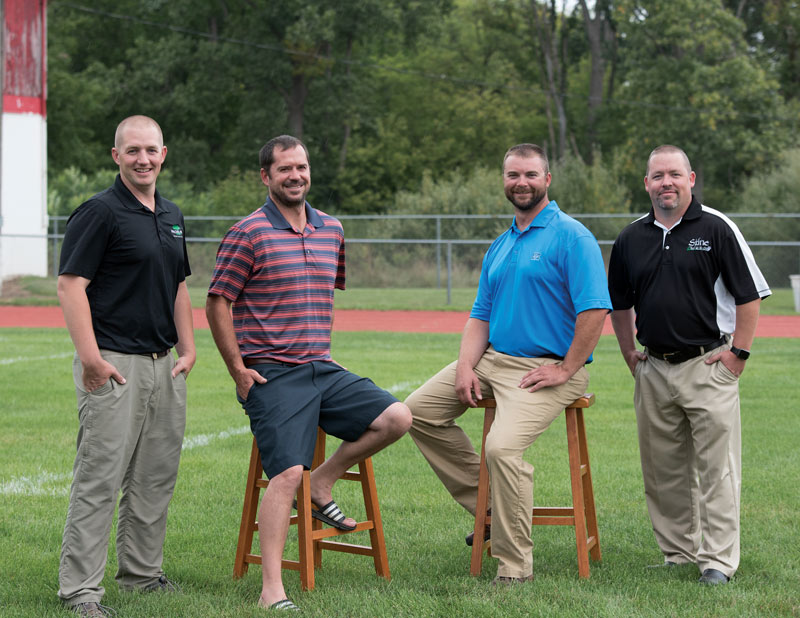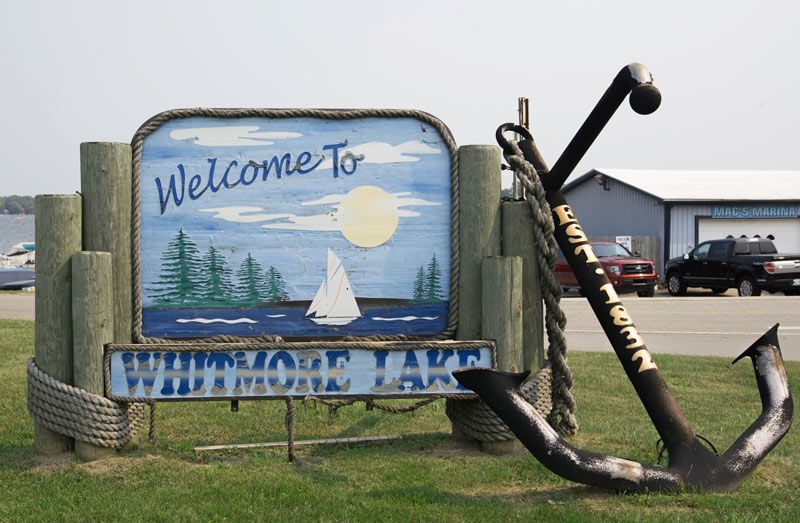
From Whitmore Lake, Mich., to the golf course management industry: (from left to right) Mike Mausolf, Kyle Reece, Martin Thompson and Dan Mausolf. Photos by Mary Jaglowski
Landowner Luke H. Whitmore probably never imagined his property would yield this type of crop.
In 1825, Whitmore moved from Seneca, N.Y., to what would become the state of Michigan 12 years later. Whitmore purchased 400 acres there at a price of $1.25 per acre, and in Whitmore’s honor, the area was named for him — Whitmore Lake. Although the town covers less than 6 square miles and has a population of only about 6,400, several boys who would become men took full advantage of the land there to develop a common bond in the golf course management industry. Here are seven of them: Jeff Nabozny, Jason Reece, Kyle Reece, Dan Mausolf, Mike Mausolf, Martin Thompson and Matt Weiland.
Coincidence? Fate? They have their own theories as to how this happened in the relatively small place sandwiched between the larger Michigan towns of Ann Arbor and Brighton. “How random is it we all ended up in the same business? The percentages are crazy if you just look at the numbers,” says Kyle Reece, a 15-year GCSAA member and the superintendent at Pine View Golf Course in Ypsilanti, Mich. “I usually attribute it to that they built a golf course in town.” (Whitmore Lake is now home to two courses.)
Kyle’s brother, Jason Reece, didn’t initially have this line of work on his radar. “I didn’t go to school for it; I went for auto tech. My brother gave me the idea to get a job at the golf course, and something inside me fell in love with it,” says Jason, assistant superintendent at Cascade Hills Country Club in Grand Rapids, Mich.
Now the athletic turf manager at Michigan State University, Amy Fouty was the golf course superintendent at Whitmore Lake Golf Links in the 1990s, and has insight into perhaps why Whitmore produced so many members of the golf course industry. “When I worked at Whitmore Lake, it was still a small community with many farms and agricultural ties. Some of these young men worked for local farmers or family farms, and worked at the golf course,” Fouty says. “The work ethic piece for these young men never had to be taught. Hard work and long hours never bothered them.”
Sandi Klump taught all the boys English at the high school, which now is the town’s junior high building. “We’ve had kids go on to do a variety of things. They’ve become professors, own their own auto repair shop, and one is a curator of a private art collection in Paris. They (the seven who entered the golf course industry) were all good kids, good students, but I never really pictured any of them going in that direction,” Klump says.

The small town of Whitmore Lake, Mich. — population 6,423 — is located right off U.S. 23, just 13 miles north of Ann Arbor.
Yet some of their ties run deep. Kyle Reece was a groomsman in Nabozny’s wedding. “I see him at least once a week. We’re still best friends and have done vacations together,” says Nabozny, the GCSAA Class A superintendent at Shanty Creek Resorts in Bellaire, Mich., and an 11-year association member. Although some members of his family worked at places synonymous with the Michigan automotive industry — General Motors and Ford — Nabozny found his niche at the golf course. “Kyle and I loved golf, and we also worked there. It was the opportunity to make money more than anything else. Opportunities for overtime. Good membership. We were young, eager to learn,” he says.
Nabozny considers the Mausolf brothers “pillars of the industry.” Dan Mausolf, 36, was previously a superintendent at Radrick Farms at the University of Michigan and is now operations manager at Stine Turf & Snow in Durand, Mich. Mike Mausolf, 35, was a superintendent at famed Oakland Hills Country Club in Bloomfield Hills, Mich., and is now operations manager at ProScape in Commerce Township, Mich. “I had 53 people in my high school class,” says Dan, a 17-year GCSAA member. “The golf course here was the best thing in the world for a high school junior or senior — to be outside, be on a $60,000 piece of equipment, mowing tees, fairways and greens. I can remember standing on No. 2 green with Amy and asking, ‘How do I do this for a career?’ It was fun.”
Mike Mausolf, a 15-year association member, was probably unlike others his age in those days. “I enjoyed waking up when the sun was coming up. I liked mowing greens, but wasn’t a big fan of changing cups,” he says. “By the time I was 18, it was almost like I was an assistant.”
Thompson, a three-year GCSAA member and the equipment manager at Travis Point Country Club in Ann Arbor, got a nudge in this industry’s direction. “I didn’t know what I was going to do until Dan got me involved,” Thompson says. “I’d always been good at fixing stuff, working on things like brakes and shocks on vehicles. If something broke, I’d want to know why it broke and what I’d have to do to get it working.”
Dan Mausolf suggested Lake City (Fla.) Community College (now Florida Gateway College), and Thompson took it to heart. Lake City, which is famous for producing graduates who join the golf industry, buoyed Thompson’s career.
Maybe the most unlikely of the group to land in this industry is Weiland. The son of a lawyer, he went to college to study political science. He eventually changed his mind, though, and followed the Mausolfs’ lead. He knows their family well, too. The Mausolfs’ mother, Deanna, was Weiland’s daycare supervisor way back when. “I wouldn’t be where I am at if it wasn’t for them,” says Weiland, who now is in Dan Mausolf’s former job as superintendent at Radrick Farms.
Weiland isn’t surprised this group is so alike after all. “I think part of it is being from a small town like Whitmore Lake. We kind of look out for each other,” he says.
Howard Richman is GCM’s associate editor.